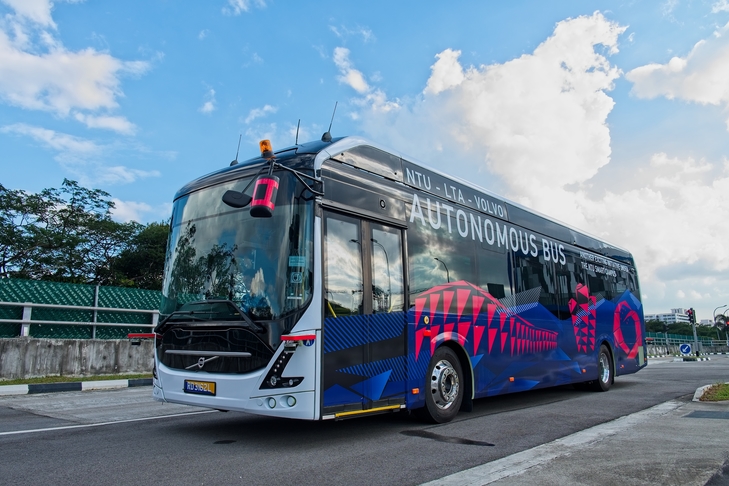Nanyang Technological University (NTU) of Singapore and Volvo Buses launched the world’s first full size, autonomous electric bus today. It is 12 metres long and has a total capacity of close to 80 passengers.
“This is a key milestone in NTU and Volvo’s development programme under the university’s partnership with the Land Transport Authority (LTA) to develop and conduct autonomous vehicle bus trials for fixed route and scheduled services,” said NTU in a press release issued today.
The state-of-the-art bus is equipped with numerous sensors and navigation controls managed by a comprehensive artificial intelligence (AI) system.
This includes light detection and ranging sensors (LIDARS), stereo-vision cameras that capture images in 3D, and an advanced global navigation satellite system that uses real-time kinematics. This is like any global positioning system (GPS), but uses multiple data sources to give pin-point location accuracy of up to one centimetre.
The system is also hooked up to an “inertial management unit”, which acts as a two-in-one gyroscope and accelerometer, measuring the lateral and angular rate of the bus. This will improve its navigation when going over uneven terrain and around sharp bends, ensuring a smoother ride.
These sensors and GPS platforms will be managed by a comprehensive AI system that was developed by NTU researchers. It not only operates the various sensors and GPS systems on the bus but also enables it to navigate autonomously through dense traffic and tropical weather conditions.
The AI system is protected with industry-leading cybersecurity and firewall measures to prevent unwanted intrusions for maximum safety and reliability.
The bus provides quiet operation with zero emissions. It also requires 80 per cent less energy than an equivalently sized diesel bus.
“This fully autonomous electric bus will play a role in shaping the future of public transportation that is safe, efficient, reliable and comfortable for all commuters,” said Professor Subra Suresh, NTU president.
“This research project not only involves cutting-edge science, technology and AI but is also an excellent example of close partnership among academia, industry and government agencies in translating basic research into products and services for the benefit of Singapore and beyond. And we have a top team of local and international partners in this multi-disciplinary collaboration,” he added.
“We are very proud to be showcasing our electric bus featuring autonomous driving technology. It represents a key milestone for the industry and is an important step towards our vision for a cleaner, safer and smarter city,” said Håkan Agnevall, president of Volvo Buses.
“The journey towards full autonomy is undoubtedly a complex one, and our valued partnership with the NTU and LTA is critical in realizing this vision, as is our commitment to applying a safety-first approach,” he added.
The bus is undergoing rigorous tests at CETRAN. Jointly set up by NTU, LTA and JTC, CETRAN is a centre dedicated to research and testing of autonomous vehicles. It replicates various elements of Singapore’s urban road condition, such as traffic signals, multiple bus stops and pedestrian crossings, and tropical conditions such as driving through heavy rain and partially flooded roads. Operated by NTU scientists, CETRAN is located on the NTU Smart Campus in the Jurong Innovation District.
A second bus will undergo tests at a bus depot managed by SMRT in April, where it will also be tested on its ability to autonomously navigate into vehicle washing bays and park safely at charging areas.
“SMRT is pleased to support the research and development of these eco-friendly autonomous electric buses. As part of the Autonomous Electric Bus trial, we will leverage on our expertise in operations and maintenance of buses, and work closely with our partners to test the command and control system required to operate a fleet of autonomous vehicles,” said Tan Kian Heong, Managing Director, Buses & Roads Services and senior vice president, Human Resources of SMRT.



